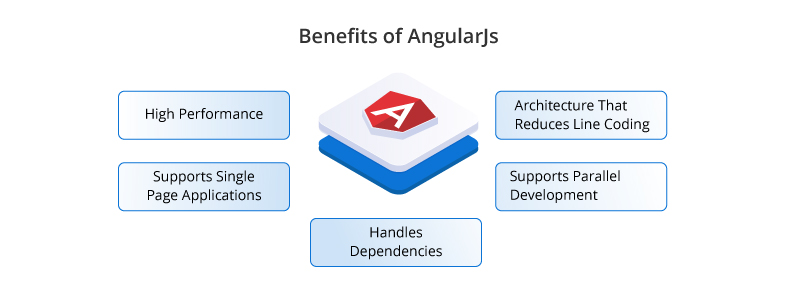Are you wondering what sets AngularJS and Angular apart? Whether you’re a developer looking to build dynamic web applications or a business owner considering which framework to use for your next project, this comparison is for you.
Angular vs AngularJS, the original version of Angular, was released in 2010 and is now considered a legacy framework. Angular, the updated version, was released in 2016 and offered improved performance, increased flexibility, and a more streamlined app development process.
In this blog, we’ll explore the key differences between AngularJS and Angular and help you decide which one is the best fit for your needs.
What is Angular?

Angular is a JavaScript framework for developing website apps. It is controlled by Google and is utilized for building dynamic, single-page web applications.
Angular uses a component-based architecture and two-way data binding to make building complex and interactive user interfaces easy.
It also includes dependency injection, routing, and a powerful template language. As a result, angular is often used to develop big and composite website apps.
Benefits of Angular Framework
Here are some of the essential benefits of the Angular framework that you must consider.
#1. Two-Way Data Binding
Angular’s two-way data binding allows for real-time updates to the view as the data model changes.
#2. Component-Based Architecture
Angular’s component-based architecture allows for easy modularization and reusability of code.
#3. Dependency Injection
Angular’s built-in dependency injection system makes managing dependencies between different components easy.
#4. TypeScript
Angular is written in TypeScript, a superset of JavaScript that adds optional static typing and other features.
#5. Large Community
Due to the size and activity of the Angular community, there are a large number of instructional and troubleshooting resources available.
#6. Built-in Directives and Services
Angular comes with various built-in directives and services, such as ng-repeat and $http, that can be used to add functionality to your application.
#7. Platform-Agnostic
You can use Angular for web, mobile web, native mobile, and desktop applications with the help of an ionic, native script, and electron frameworks.
What is Angular JS?
AngularJS is a JavaScript-based web apps framework first released in 2010. It is developed and maintained by Google and is designed to make it easier to build dynamic, complex web applications by providing a framework for building reusable components and handling common tasks such as data binding and dependency injection.
AngularJS uses a two-way data binding model and a declarative approach to building user interfaces, making it a popular choice for building single-page web applications.
Benefits of AngularJS

AngularJS is a JavaScript framework that allows developers to build dynamic, single-page web applications. Some benefits of using AngularJS include:
1. Two-Way Data Binding
Between the model and the display, AngularJS seamlessly integrates data. This makes it easier to create responsive and dynamic user interfaces.
2. Reusable Components
AngularJS allows developers to create reusable components that can be used across multiple pages and applications.
3. MVC Architecture
AngularJS follows the Model-View-Controller architectural pattern, which helps to organize and structure code in a logical and maintainable way.
4. Dependency Injection
AngularJS uses dependency injection, which makes it easier to manage dependencies between different components and services in an application.
5. Unit Testing
AngularJS was designed to be unit testable, which makes it easier to write and maintain automated tests for an application.
6. Large and Active Community
AngularJS has a large and active community of developers who contribute to the framework and provide support to others.
Difference Between Angular and AngularJS
Now that you are familiar with the Angular and AngularJS framework, it is time to learn the difference between them. So let’s have a look at them.
| Feature | Angular | AngularJS |
| Language | Typescript | Javascript |
| Architecture | Use components | Use MVC |
| Mobile Support | Mobile browsers are supportive | Mobile browsers are not supportive |
| Routing | Angular uses @RouteConfig{(…)}. | AngularJS uses $routeprovider.when() |
| Speed | Facilitates better structure and speed | By creating more processing on the client side, page load takes a significant amount of time |
| Dependency Injection | Uses dependency injection | Does not use dependency injection |
| Expression Syntax | Concentrates on “( )” for event binding and “[ ]” for property binding | Uses the ng-Directive |
- Architecture
AngularJS uses a model-view-controller (MVC) architecture, while Angular uses a component-based architecture. This means that AngularJS applications are built with a clear separation of concerns, while Angular applications are built with reusable components.
- Language
AngularJS uses JavaScript, while Angular uses TypeScript. TypeScript is a superset of JavaScript that adds optional static typing and other features, making it more suitable for large and complex applications.
- Speed
Angular generally has better performance than AngularJS. This is because angular utilizes a faster change detection mechanism, allowing it to update the view more efficiently. Additionally, Angular has improved support for mobile devices and can run on a wider range of devices, including low-powered devices.
- Dependency Injection
Angular uses a more powerful and flexible dependency injection system than AngularJS. In AngularJS, dependency injection is based on the use of global objects, whereas in Angular, dependency injection is based on a hierarchical tree of injectors. This allows for more fine-grained control over the injection of dependencies and can make it easier to manage the dependencies of large and complex applications.
- Expression Syntax
In AngularJS, expressions are written using a double curly brace notation, like {{ expression }}. In Angular, expressions are written using a double square bracket notation, like [expression]. This change was made to improve performance and make the framework more consistent with other modern web technologies.
- Routing
In AngularJS, routing is typically handled using third-party libraries such as ngRoute or ui-router. In contrast, Angular includes its built-in routing module, which makes it easier to set up and configure routing within an Angular application. The new version also improved the way the routing works by adding more powerful features and making it more flexible.
- Mobile Support
Angular has better mobile support than AngularJS as it has a smaller bundle size and improved performance on mobile devices. Additionally, Angular has more features and capabilities than AngularJS, including support for progressive web apps. Angular supports ionic and Nativescript, while angularJS lacks this.
Conclusion
AngularJS is an older framework, and Angular is a newer and improved version; Angular is more efficient and scalable than AngularJS, but both are used to build complex web applications.
AngularJS vs Angular is the most popular differentiation that most developers search for. However, despite being powerful JavaScript frameworks, each has some notable differences you should know before deciding which one to use for your project.



























